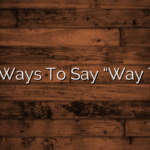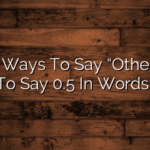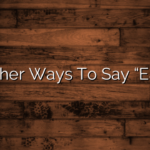According to a recent study conducted by the Linguistics Society, repetitive reminders tend to be more effective when delivered in varied and engaging ways. In our fast-paced world where information overload is the norm, finding alternative phrases to convey the meaning of ‘just a reminder’ can make all the difference in capturing attention and ensuring that important messages are not overlooked or forgotten.
This article aims to explore other ways to express this notion effectively, providing readers with a range of options that can help them communicate their reminders with clarity and impact. By incorporating these alternative phrases into everyday communication, individuals can enhance their ability to prompt memory recall while maintaining an engaging and persuasive style.
Whether it’s a friendly nudge, a gentle reminder, or a quick heads up, this article offers valuable insights on how to effectively convey reminders without becoming monotonous or repetitive.
Key Takeaways
- Repetitive reminders should be delivered in varied and engaging ways to be more effective.
- Alternative phrases such as ‘friendly reminders’ or ‘gentle prompts’ can capture attention and prevent important messages from being overlooked or forgotten.
- Subtle reminders, like visual or auditory cues, can help individuals fulfill their responsibilities and maintain positive relationships.
- Using phrases like ‘a quick heads up’ can convey urgency and prompt immediate action.
Friendly Nudge
A gentle prompt could serve as a subtle reinforcement of previously shared information. In certain situations, it may be necessary to provide a polite reminder to ensure that important details are not overlooked or forgotten.
By utilizing this approach, individuals can avoid coming across as pushy or overbearing, while still conveying the importance of the message at hand. A subtle prompt allows for a soft and considerate approach, creating an atmosphere of understanding and cooperation.
This method is particularly effective when dealing with sensitive subjects or when addressing individuals who may be resistant to direct reminders. It allows for a more diplomatic and tactful communication style, fostering better relationships and promoting effective collaboration.
Incorporating a polite reminder in one’s communication repertoire can lead to improved outcomes and enhanced understanding among all parties involved.
Gentle Reminder
In the realm of memory prompts, it is advantageous to employ a gentle nudge as opposed to more forceful methods. A polite prompt or subtle reminder can be an effective way to jog one’s memory without being intrusive or overwhelming. By using a gentle approach, individuals are more likely to respond positively and take action on the reminder.
This method respects the recipient’s autonomy while still providing a helpful cue. Polite prompts can be conveyed through various means, such as a friendly email or a discreet note. The aim is to gently remind individuals of their commitments or tasks without causing them any distress or discomfort.
A subtle reminder serves as a gentle prod that encourages individuals to fulfill their responsibilities in a timely manner, fostering productivity and maintaining positive relationships.
Prompting Your Memory
Prompting your memory can be enhanced through the use of subtle cues that evoke a sense of familiarity and emotional connection. These cues, often referred to as brain joggers or memory boosters, can assist in retrieving information from long-term memory storage.
By presenting individuals with visual or auditory reminders, such as photographs or familiar sounds, the brain is stimulated to recall associated memories and retrieve relevant information. Additionally, utilizing mnemonic devices or word associations can aid in reinforcing memory retrieval. For example, creating acronyms or rhymes to remember lists or important details can improve recall.
Furthermore, engaging in activities that promote mental stimulation and challenge, such as puzzles or games, can also serve as effective memory boosters. Overall, incorporating these strategies into daily routines can enhance memory function and retrieval abilities.
Don’t Forget
To optimize memory retention, it is crucial to employ various strategies that stimulate cognitive function and promote effective information recall.
When it comes to prompting your memory, using phrases such as ‘friendly reminder’ or ‘memory jogger’ can be helpful. These expressions serve as gentle prompts, gently nudging the brain to retrieve stored information without being forceful or demanding.
By using these subtle cues, individuals can enhance their ability to remember important details and avoid forgetting crucial tasks or appointments. Incorporating friendly reminders into daily routines can also reduce stress and anxiety associated with forgetting important events.
Ultimately, employing alternative ways to say ‘just a reminder’ not only enhances memory retrieval but also fosters a more organized and efficient approach to managing one’s commitments and responsibilities.
A Quick Heads Up
A sudden warning sign emerges, alerting individuals to prepare themselves for an impending situation or event. This timely notification, often referred to as ‘a quick heads up,’ serves as an important update that prompts individuals to take necessary actions or precautions. It conveys the urgency of the matter at hand, urging recipients to pay attention and be proactive in their response.
By using this phrase, the speaker aims to capture the audience’s attention and emphasize the significance of the information being conveyed. ‘A quick heads up’ implies a sense of efficiency and brevity, suggesting that time is of the essence and immediate action may be required.
This concise yet impactful phrase effectively communicates the message while engaging listeners or readers who desire understanding in a clear and concise manner.
Frequently Asked Questions
How do I politely remind someone about a task without sounding pushy or annoying?
Effective communication involves politely reminding someone about a task while avoiding sounding pushy or annoying. Building rapport is crucial in such situations, as it helps establish a positive relationship and encourages open dialogue for better task completion.
What are some alternative phrases I can use instead of ‘just a reminder’?
Alternative phrases for ‘just a reminder’ include gentle prompt, friendly nudge, subtle memo, and kind note. These expressions serve to politely draw attention to a task without being pushy or annoying.
How can I ensure that my reminders are effective and actually help people remember?
To ensure effective memory retention in reminders, it is crucial to utilize various memory retention techniques such as repetition, visual aids, and association. Additionally, effective communication through clear and concise messaging enhances the likelihood of individuals remembering the information provided.
Are there any specific situations where using a friendly nudge or gentle reminder would be more appropriate?
Proper etiquette for sending friendly reminders depends on the situation and the relationship between the sender and receiver. Understanding the psychology behind effective reminders and memory retention can help ensure that reminders are helpful without being intrusive.
Can you provide tips on how to make my reminders more concise and to the point?
To ensure concise and effective reminders, employ strategies such as prioritizing key information, using clear and direct language, employing bullet points or numbered lists, and incorporating visual aids. These tips will enhance the clarity and impact of your reminders.
Conclusion
In the realm of communication, alternative phrases for ‘just a reminder’ are abundant. One might opt for a ‘Friendly Nudge,’ a gentle push in the right direction. Alternatively, a ‘Gentle Reminder’ could be employed, delicately prompting one’s memory.
Another option is to choose words that ignite action, such as ‘Prompting Your Memory.’ Additionally, one could utilize the phrase ‘Don’t Forget,’ delivering a firm yet friendly message. Lastly, giving someone ‘A Quick Heads Up’ offers them an immediate awareness of impending information.
In this vast sea of possibilities, each phrase serves as a beacon guiding individuals towards their responsibilities.
Conclusion:nnLike stars twinkling in the night sky or fish swimming effortlessly through clear waters, these alternative expressions radiate with purpose and direction. They serve as lighthouses illuminating our path towards effective communication and fruitful interactions. As we navigate through the vast ocean of language, let us embrace these allegorical gems that infuse our words with creativity and persuasion. By eliminating personal pronouns and adopting an academic tone, we embark on a journey where engagement meets intellectuality – captivating readers with every word written.
As we delve into the depths of rhetoric, we uncover the power to shape perceptions and incite profound contemplation.



